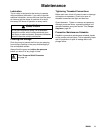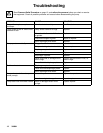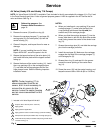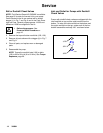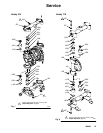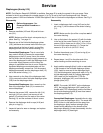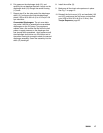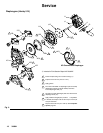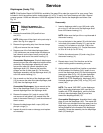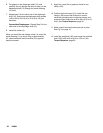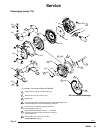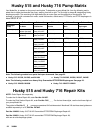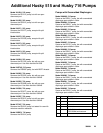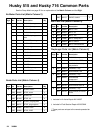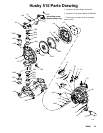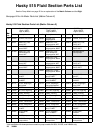
19308981
Service
Diaphragms (Husky 716)
NOTE: Fluid Section Repair Kit D05XXX is available. See page 22 to order the correct kit for your pump. Parts
included in the kit are marked with a double dagger (}) in Fig. 10 and in the Parts Drawings and Lists. General
purpose grease 111920 and Adhesive 113500 are supplied in the kit. Service the diaphragms as follows. See
Fig. 10.
Disassembly
1. Relieve the pressure. See
Pressure Relief Procedure on
page 10.
2. Remove the manifolds (102) and fluid cov-
ers (101).
NOTE: Make sure all the check valve parts stay in
place. See Fig. 8 on page 15.
3. Remove the grounding strip from the vee clamps
(109), and remove the vee clamps.
4. Remove one of the fluid-side diaphragm plates
(133) (whichever one comes loose first when you
use a wrench on the hex of each), and pull the
diaphragm shaft out of the center housing (11).
Overmolded Diaphragms: Grip both diaphragms
securely around the outer edge and rotate counter-
clockwise. One diaphragm assembly will come
free and the other will remain attached to the
diaphragm shaft (15). Remove the freed dia-
phragm and the air side plate (6). Pull the other
diaphragm assembly and the diaphragm shaft (15)
out of the center housing (11).
5. Use a wrench on the flats of the diaphragm shaft
(15) to remove the other fluid-side diaphragm plate
(133) from the diaphragm shaft.
Overmolded Diaphragms: Use a wrench on the
flats of the diaphragm shaft (15) to remove the
second diaphragm from the diaphragm shaft.
6. Remove the screws (141) and air covers (136),
and remove all old gasket (12) material from the
ends of the center housing (11) and the surfaces of
the air covers.
7. Remove the diaphragm shaft u-cups (416) and
pilot pin o-rings (1).
8. Inspect all parts for wear or damage, and replace
as necessary.
Reassembly
1. Insert a diaphragm shaft u-cup (416) and a pilot
pin o-ring (1) into the end of the diaphragm shaft
bore of the center housing (11).
NOTE: Make sure the lips of the u-cup face out of
the center housing.
2. Line up the holes in the gasket (12) with the holes
in the end of the center housing (11), and use six
screws (141) to fasten an air cover (136) to the
end of the center housing (11). Torque the screws
to 35 to 45 in-lb (4.0 to 5.1 N-m).
3. Position the exhaust cover (13) and o-ring (4) on
the center housing (11).
4. Repeat steps 1 and 2 for the other end of the
center housing and the remaining air cover.
5. Apply medium-strength (blue) Loctite or equivalent
to the threads of the screws (140). Install on one
end of the diaphragm shaft (15) the following parts
(see proper order in Fig. 10): air-side diaphragm
plate (6), backup diaphragm (402, used only on
models with PTFE diaphragms), diaphragm (401),
fluid-side diaphragm plate (133), o-ring (115), and
screw (140).
NOTE: The words “AIR SIDE” on the diaphragm
(401), the backup diaphragm (402, used only on
models with PTFE diaphragms), and the flat side
of the air-side diaphragm plate (6) must face
toward the diaphragm shaft (15).
Overmolded Diaphragms: Assemble the air–side
plate (6) onto the diaphragm (401). The words AIR
SIDE on the air side plate must face away from the
diaphragm. Apply medium–strength (blue) thread
locking adhesive to the threads of the diaphragm
assembly. Screw the assembly into the diaphragm
shaft (15) hand tight.



